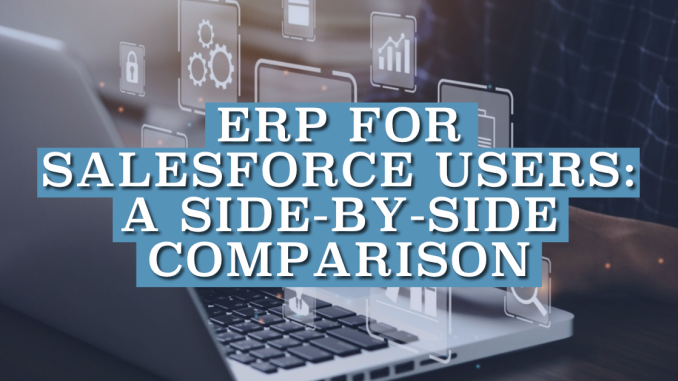
For companies that have standardized on Salesforce, a natural question emerges: should ERP live on the same platform as CRM? Increasingly, the answer is yes. Salesforce-native ERP solutions eliminate the friction of integrations, bring customer and operational data together, and leverage Salesforce’s ecosystem of scalability, compliance, and AI.
This article examines leading Salesforce-native ERP vendors available on AppExchange: Axolt, Rootstock, Ascent ERP, and Accounting Seed. It highlights how each approaches inventory, procurement, manufacturing, and finance.
Why Salesforce-Native Matters
Opting for an ERP solution built entirely on Salesforce offers strategic advantages:
- Unified Data Model: CRM, sales, operations, and finance share a single source of truth. No syncing, no fragmentation.
- Rapid Implementation: "Clicks not code" customization and seamless Salesforce upgrades reduce IT burden.
- Scalability & Security: Native apps inherit Salesforce’s enterprise-grade infrastructure, compliance certifications, and AI capabilities like Einstein and Agentforce.
- AI-Readiness: Embedding intelligence into ERP workflows enables predictive planning, anomaly detection, and conversational interactions through Salesforce AI.
Capabilities Overview
Here’s a high-level comparison across four key domains.
| Capability | Axolt | Rootstock | Ascent ERP | Accounting Seed |
|---|---|---|---|---|
| Inventory | Real-time stock monitoring, multi-warehouse control, barcode scanning, batch/serial tracking, automated replenishment, seasonal/safety stock planning | Lot/serial traceability, cycle counting, FIFO/LIFO costing, strong traceability and accuracy controls | Inventory tied closely to sales orders and fulfillment; strong for distribution use cases | Limited inventory; finance-focused with integrations for stock control |
| Procurement | Vendor & procurement management, automated purchasing, requisition approvals, supplier performance dashboards | Procurement integrated with supply chain and financial modules; multi-facility sourcing | Focus on order fulfillment; procurement handled but less advanced than Axolt/Rootstock | Procurement minimal; relies on finance workflows |
| Manufacturing | MPS, BOM, work orders, routing, real-time shop-floor tracking, quality workflows, change control | Robust for complex environments: make-to-stock, make-to-order, configure/engineer-to-order | Solid production execution for mid-market manufacturers; strong in discrete workflows | Not focused on manufacturing |
| Finance | Full finance suite: GL, AR, AP, budgeting, forecasting, invoicing, reconciliation | AR/AP, GL, cost management, real-time reporting tied to manufacturing/inventory | Integrates with Salesforce CPQ and order management; limited standalone finance | Comprehensive finance: GL, AR/AP, multi-ledger, strong accounting-first design |
In-Depth Comparison
Inventory
- Axolt emphasizes automation and agility. Warehouse control, barcoding, seasonal planning, and replenishment directly on Salesforce.
- Rootstock brings mature manufacturing-grade inventory features such as lot/serial traceability and robust costing methods.
- Ascent ERP focuses on inventory tied to order management, appealing to distribution-heavy businesses.
- Accounting Seed is finance-first, offering basic stock capabilities but typically paired with third-party inventory systems.
Procurement
- Axolt builds visibility and intelligence into procurement. Automated requisitions, supplier performance tracking, and integration with finance.
- Rootstock ties procurement tightly to manufacturing and inventory workflows, particularly useful in multi-facility environments.
- Ascent ERP handles procurement more lightly, reflecting its distribution-oriented design.
- Accounting Seed provides only basic vendor payments, not full procurement.
Manufacturing
- Axolt offers a full manufacturing execution suite. BOM, routing, MPS, real-time shop floor data, and quality workflows.
- Rootstock stands out for flexibility, supporting multiple manufacturing models including configure-to-order and engineer-to-order.
- Ascent ERP delivers straightforward production control suited for mid-sized manufacturers with less complexity.
- Accounting Seed is not a manufacturing solution.
Finance
- Axolt integrates finance deeply into operations, providing forecasting, budgeting, reconciliation, and reporting. All on Salesforce.
- Rootstock delivers strong manufacturing cost control and financial reporting but is less finance-centric than Axolt or Accounting Seed.
- Ascent ERP integrates with Salesforce CPQ and billing but lacks full financial depth.
- Accounting Seed is the most finance-focused, excelling at general ledger, multi-ledger accounting, and regulatory compliance.
Choosing the Right Fit
The best ERP choice depends on organizational priorities:
- Axolt: Best suited for companies seeking a full-suite ERP. Inventory, manufacturing, logistics, procurement, and finance. All unified on Salesforce with AI-ready workflows. Strong fit for manufacturers, MedTech, pharma, and distribution where operations and finance must align tightly.
- Rootstock: Ideal for complex manufacturers that need flexibility in production models and advanced inventory control.
- Ascent ERP: Practical for distribution and order-driven businesses that want Salesforce-native order-to-fulfillment with lighter manufacturing needs.
- Accounting Seed: The go-to choice for organizations seeking finance-first ERP, with deep accounting but lighter operational modules.
The Salesforce-Native Advantage
Regardless of vendor, the choice to keep ERP inside Salesforce delivers:
- Seamless data flow: Sales forecasts feed operations instantly; operational data flows back to finance.
- Reduced IT burden: Fewer integrations, simpler upgrades.
- Better strategic visibility: Unified dashboards across sales, operations, and finance.
- AI enablement: Leveraging Salesforce Einstein and Agentforce to make ERP predictive, proactive, and conversational.
Salesforce users face a critical choice when extending ERP: bolt-on integrations, or native apps that unify front- and back-office data. Axolt, Rootstock, Ascent ERP, and Accounting Seed all demonstrate the growing power of Salesforce-native ERP.
- Axolt positions itself as the most comprehensive, with modules spanning operations and finance.
- Rootstock excels in manufacturing precision.
- Ascent ERP is nimble for order-driven businesses.
- Accounting Seed dominates in finance.
For executives, the decision is less about features in isolation than about which operating model fits your business strategy best. What unites all of them is the Salesforce-native advantage: ERP that doesn’t just integrate with CRM. It is CRM’s operational counterpart.
Leave a Reply